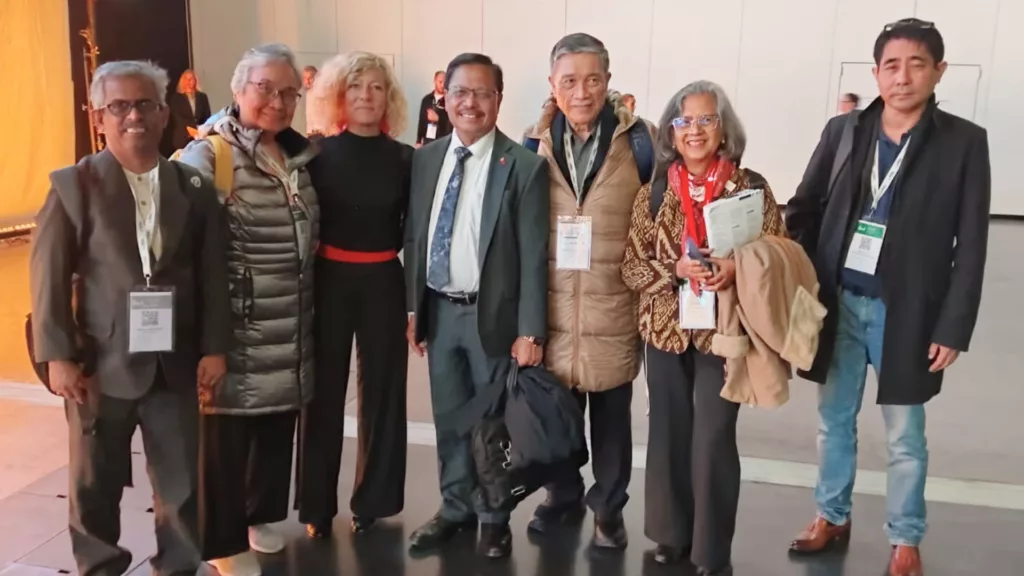
📚Originally published by ASSEC – Society for Asian Solidarity Economy
A talk entitled “Guaranteeing and Strengthening the Right to Social Protection through SSE” delivered by ASEC Rep in RIPESS, Kumar Loganathan, Co-coordinator for Asia, RIPESS | Association for Sarva Seva Farms (ASSEFA) in India on October 31, 2025 at GSEF International Conference at Bordeaux, France.
It’s an honour to join you to reflect on how the Social and Solidarity Economy (SSE) can help guarantee and strengthen the right to social protection, especially in the context of India’s diverse and largely informal economy.
I will focus on two points:
- How cooperatives can expand access to social protection in a country of diversity and precarious workers like India; and
- What partnerships have enabled ASEC cooperatives, particularly ASSEFA, to ensure integrated and sustainable social protection.
1. Social protection in India
India is a land of remarkable diversity — culturally, linguistically, and socially. Its 28 States and Union Territories each have distinct traditions, foods, and dialects. With 22 official languages and over 1,400 dialects, India exemplifies unity in diversity.
It is the birthplace of Hinduism, Buddhism, Jainism, and Sikhism, and its shared ethos of tolerance, respect, and democracy continues to guide national life. Despite differences, Indians share a deep sense of unity and collective responsibility — values that also underpin the country’s social and solidarity initiatives.
In addition, India’s population exceeds 1.4 billion, and more than 80% of its workforce — around 400 to 500 million people — is employed in the informal economy, contributing 45–50% of GDP (US$ 3,900 billion). Nearly 60% of informal workers are in agriculture, construction, and hospitality.
Formal, state-led social protection remains limited and fragmented. Many informal workers lack access to insurance, pensions, or welfare programs. To fill this gap, cooperatives and Social and Solidarity Economy (SSE) organizations have become vital actors, extending protection through trust-based, community-driven systems.
Across India, SSE entities engage nearly 299 million informal workers, including 287 million cooperative members, 10 million women in self-help groups (SHGs), and 1.96 million producers in farmer organizations. They provide access to loans, insurance, and social pensions, helping families avoid debt traps and cope with crises. For instance, SHGs have outstanding bank loans worth US$ 16,800 million — demonstrating the scale of community finance in rural India.
2. ASSEFA – ASEC: Partnerships for Sustainable Social Protection
Asian Solidarity Economic Council (ASEC), a regional network of 14 countries promoting the Social and Solidarity Economy (SSE) through advocacy, policy engagement and training— amplifies these local efforts into a regional movement.
ASSEFA (Association for Sarva Seva Farms), founded on Gandhian ideals of Sarvodaya — the welfare of all — is a pioneer in solidarity-based rural development. Guided by the principles of decentralised governance and trusteeship, ASSEFA operates through 165 community-based institutions, reaching over one million rural people.
Its model emphasizes community ownership, prioritizing vulnerable groups — widows, destitute, and the elderly. ASSEFA’s social protection work rests on three pillars:
- Community-managed Social Protection Funds: Self-help groups pool small contributions to cover health, maternity, education, funeral needs and mass wedding for couples from vulnerable families.
- Integration with Livelihoods and Finance: Federations link protection with agriculture, dairy, and enterprise programs.
- Partnerships for Risk Pooling and Capacity Building: Through the Asian Solidarity Economy Council (ASEC), ASSEFA exchanges learning and practices with cooperatives across Asia.
The ASSEFA–ASEC partnership demonstrates how community innovation, mutual learning, and solidarity financing can make social protection both inclusive and sustainable.
In conclusion, India’s experience, strengthened by organizations like ASSEFA and other SSE organizations, show that the path to universal social protection lies in partnerships rooted in solidarity and community empowerment — reflecting the spirit of unity in diversity that defines the nation.



